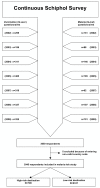Trends in the knowledge, attitudes and practices of travel risk groups towards prevention of malaria: results from the Dutch Schiphol Airport Survey 2002 to 2009
- PMID: 22642661
- PMCID: PMC3413569
- DOI: 10.1186/1475-2875-11-179
Trends in the knowledge, attitudes and practices of travel risk groups towards prevention of malaria: results from the Dutch Schiphol Airport Survey 2002 to 2009
Abstract
Background: Previous studies investigating the travellers' knowledge, attitudes and practices (KAP) profile indicated an important educational need among those travelling to risk destinations. Initiatives to improve such education should target all groups of travellers, including business travellers, those visiting friends and relatives (VFRs), and elderly travellers.
Methods: In the years 2002 to 2009, a questionnaire-based survey was conducted at the Dutch Schiphol Airport with the aim to study trends in KAP of travel risk groups towards prevention of malaria. The risk groups last-minute travellers, solo-travellers, business travellers, VFRs and elderly travellers were specifically studied.
Results: A total of 3,045 respondents were included in the survey. Travellers to destinations with a high risk for malaria had significantly more accurate risk perceptions (knowledge) than travellers to low-risk destinations. The relative risk for malaria in travellers to high-risk destinations was probably mitigated by higher protection rates against malaria as compared with travellers to low risk destinations. There were no significant differences in intended risk-taking behaviour. Trend analyses showed a significant change over time in attitude towards more risk-avoiding behaviour and towards higher protection rates against malaria in travellers to high-risk destinations. The KAP profile of last-minute travellers substantially increased their relative risk for malaria, which contrasts to the slight increase in relative risk of solo travellers, business travellers and VFRs for malaria.
Conclusions: The results of this sequential cohort survey in Dutch travellers suggest an annual 1.8% increase in protection rates against malaria coinciding with an annual 2.5% decrease in intended risk-seeking behaviour. This improvement may reflect the continuous efforts of travel health advice providers to create awareness and to propagate safe and healthy travel. The KAP profile of last-minute travellers, in particular, substantially increased their relative risk for malaria, underlining the continuous need for personal protective measures and malaria chemoprophylaxis for this risk group.
Figures
Similar articles
-
Trends in the knowledge, attitudes and practices of travel risk groups toward prevention of hepatitis B: results from the repeated cross-sectional Dutch Schiphol Airport Survey 2002-2009.Travel Med Infect Dis. 2014 Mar-Apr;12(2):149-58. doi: 10.1016/j.tmaid.2013.09.002. Epub 2013 Sep 29. Travel Med Infect Dis. 2014. PMID: 24103746
-
Trends in knowledge, attitudes, and practices of travel risk groups toward prevention of hepatitis A: results from the Dutch Schiphol Airport survey 2002 to 2009.J Travel Med. 2012 Jan-Feb;19(1):35-43. doi: 10.1111/j.1708-8305.2011.00578.x. Epub 2011 Dec 8. J Travel Med. 2012. PMID: 22221810
-
The knowledge, attitudes and practices of wintersun vacationers to the Gambia toward prevention of malaria: is it really that bad?Malar J. 2014 Feb 28;13:74. doi: 10.1186/1475-2875-13-74. Malar J. 2014. PMID: 24581328 Free PMC article.
-
A systematic review of factors affecting adherence to malaria chemoprophylaxis amongst travellers from non-endemic countries.Malar J. 2020 Jan 13;19(1):16. doi: 10.1186/s12936-020-3104-4. Malar J. 2020. PMID: 31931813 Free PMC article.
-
Malaria prevention in the older traveller: a systematic review.J Travel Med. 2019 Oct 14;26(7):taz067. doi: 10.1093/jtm/taz067. J Travel Med. 2019. PMID: 31509199
Cited by
-
Vaccination and Malaria Prevention among International Travelers Departing from Athens International Airport to African Destinations.J Trop Med. 2014;2014:563030. doi: 10.1155/2014/563030. Epub 2014 Mar 2. J Trop Med. 2014. PMID: 24719621 Free PMC article.
-
Malaria chemoprophylaxis: cross-sectional study of use among air travellers departing from Accra, Ghana.Malariaworld J. 2017 Feb 28;8:2. doi: 10.5281/zenodo.10756885. eCollection 2017. Malariaworld J. 2017. PMID: 38596775 Free PMC article.
-
Severe malaria in Europe: an 8-year multi-centre observational study.Malar J. 2017 Jan 31;16(1):57. doi: 10.1186/s12936-016-1673-z. Malar J. 2017. PMID: 28143519 Free PMC article.
-
Preparedness against self-infection and importation of Malaria - An airport survey among Saudis traveling to endemic countries.J Family Med Prim Care. 2019 Oct 31;8(10):3318-3324. doi: 10.4103/jfmpc.jfmpc_649_19. eCollection 2019 Oct. J Family Med Prim Care. 2019. PMID: 31742162 Free PMC article.
-
Investigating Awareness Regarding Travel-Related Infectious Disease Prevention in a Metropolitan Area.Trop Med Infect Dis. 2023 Oct 18;8(10):476. doi: 10.3390/tropicalmed8100476. Trop Med Infect Dis. 2023. PMID: 37888604 Free PMC article.
References
-
- Jelinek T, Schade Larsen C, Siikamaki H, Myrvang B, Chiodini P, Gascon J, Visser L, Kapaun A, Just-Nubling G. European cluster of imported falciparum malaria from Gambia. Euro Surveillance. 2008;13:pii=19077. - PubMed
-
- Van Herck K, Zuckerman J, Castelli F, Van Damme P, Walker E, Steffen R. European Travel Health Advisory Board: Travellers’ knowledge, attitudes, and practices on prevention of infectious diseases: results from a pilot study. J Travel Med. 2003;10:75–78. - PubMed
-
- Van Herck K, Van Damme P, Castelli F, Zuckerman J, Nothdurft H, Dahlgren AL, Gisler S, Steffen R, Gargalianos P, Lopéz-Vélez R, Overbosch D, Caumes E, Walker E. Knowledge, attitudes and practices in travel-related infectious diseases: The European Airport Survey. J Travel Med. 2004;11:3–8. - PubMed
-
- Van Genderen PJ, van Thiel PP, Mulder PG, Overbosch D. on behalf of the Schiphol Airport Study Group. Trends in knowledge, attitude and practices of travel risk groups towards prevention of hepatitis A: results from the Schiphol Aiport Survey 2002–2009. J Travel Med. 2012;19:35–43. doi: 10.1111/j.1708-8305.2011.00578.x. - DOI - PubMed
MeSH terms
LinkOut - more resources
Full Text Sources
Medical


